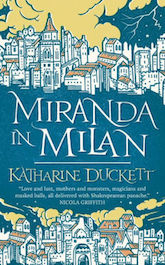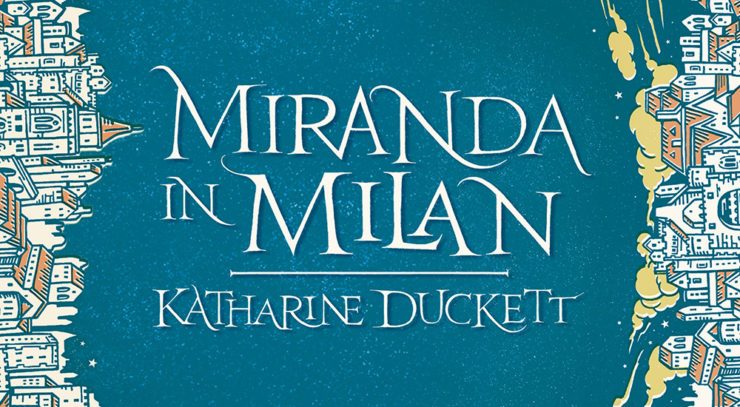In William Shakespeare’s The Tempest, Prospero is cast as the victim of a usurpation, a man cast out from his duchy and abandoned on a magical island with only his wits to save him. His daughter, Miranda, is little more than a plot point to set up his eventual rescue. Carrying on the ongoing literary tradition of reimagining Shakespeare, Katharine Duckett picks up the tale after the magician and his daughter make their triumphant return to Milan. Instead of following Prospero’s adventures and sending Miranda off to become the tepid wife of Ferdinand, Duckett puts the spotlight on Miranda.
A brave new world awaits Miranda as she leaves her island for Milan. But what was supposed to be a fresh start for her and her father quickly sours. Prospero abandons Miranda as he pursues his secretive plans for his reclaimed duchy, and the girl who once ran wild on a Mediterranean island is now locked inside her rooms in a dark, cold castle. Her only other family, her aunt Agata, loathes her, and the servants fear her, whispering behind Miranda’s back that she looks like the ghostly reincarnation of her dead mother. Unable to walk the grounds unescorted or mingle in society without a veil hiding her face, and in the absence of letters from her fiance, Ferdinand, Miranda falls into despair.
Until she meets Dorothea. Her new Moorish maid isn’t afraid of Miranda’s looks or the rumors swirling around the castle. The bewitching witch opens Miranda’s eyes to the realities of Milan and the endless possibilities of the world. The women grow close in their quest to uncover the truth buried by Prospero’s lies, but his dark magic threatens not only their romance but the whole of Milan.
In The Tempest, Trinculo suggests that a tour through England as an attraction would turn Caliban from a monster to a man through exposure to civilization. But Miranda in Milan challenges this claim and posits that civilized society is what allows men to become monsters in the first place. As a duke, Prospero should be the pinnacle of society, representing the best that Italy has to offer, the epitome of Milanese culture. Yet he’s heartless, power-mad, and self-centered to the point of negligence.
Prospero treats Miranda like an object; she’s a mark of his virility, a trophy to be awarded to the man of his choosing, and a pawn in his cruel games. Duckett offers her protagonist agency and voice. Her Miranda isn’t willing to live a life of unhappiness trapped in her father’s castle, yet neither does she want to trade his prison for Ferdinand’s gilded cage. This Miranda wants a life to call her own. She wants to run and play and love and explore, not be bound on the end of a man’s short leash. I wouldn’t go so far as to call her a feminist activist—there’s too much she doesn’t know or understand for her to truly be a revolutionary. But within the bounds set by Shakespeare and our own modern interpretations of Elizabethan femininity and sexism, Duckett’s Miranda stands out, particularly once Dorothea draws her out.
Buy the Book


Miranda in Milan
When reading Miranda in Milan, it’s easy to interpret Miranda and Dorothea’s relationship as unequal. Dorothea acts as Miranda’s assistant and guide and takes on the bulk of the emotional and physical labor while Miranda coasts on her whiteness, wealth, and privilege. That wouldn’t be an inaccurate reading of the text, but is an incomplete one. While in Italy, Dorothea and Miranda are subject to the formality and rigidity of the patriarchy and monarchy, whether they want to be or not. It takes Miranda most of the novella to come to the same conclusion Dorotha arrived at a long time ago—that she doesn’t want to be beholden to men’s rules—but she embraces rather than resists that conclusion. Duckett takes Shakespeare’s already somewhat critical take on the patriarchy and overlays it with contemporary feminism, not so much that it breaks the story but enough that it feels more grounded in reality than the original play.
There’s an intriguing comparison to be made between how Prospero treats Caliban and how the Spanish and Italians treat the Moors and Dorothea. Both Dorothea and Caliban are African, albeit from different regions and with different coloring, and both are bound by the laws of white men. Because of her lighter skin tone, Dorothea has enough passing privilege to secure her a job in a castle, but she walks a precarious tightrope. Too much sun and she risks being found out and even killed for her deception. Yet even with her colorism-based privilege, Dorothea is still treated as inferior by her fellow servants. Her magic isn’t the root of their disdain, but it doesn’t help her cause, either.
Caliban is called “a born devil, on whose nature / Nurture can never stick.” A case could be made that, like Dorothea, it’s not his magic that makes the others see him as a brute—Prospero views others’ magic as an annoying interference rather than something abhorrent and degrading—but his race. I wish Duckett had explore race a little more in the story. Most of the racially relevant questions she poses are left unanswered to such an extent that it does a disservice to the thematic elements, especially in the face of her deep dive into feminism, the patriarchy, and sexual identity.
Miranda in Milan is a delightfully charming and dreadfully suspenseful novella. As much as I enjoyed the themes and characters, I loved the experience of reading it even more. Katharine Duckett is an evocative writer who truly understands her world, her story, her characters. I can’t wait to see what she does next.
Miranda in Milan is available from Tor.com Publishing.
Alex Brown is a high school librarian by day, local historian by night, author and writer by passion, and an ace/aro Black woman all the time. Keep up with her on Twitter and Insta, or follow along with her reading adventures on her blog.










